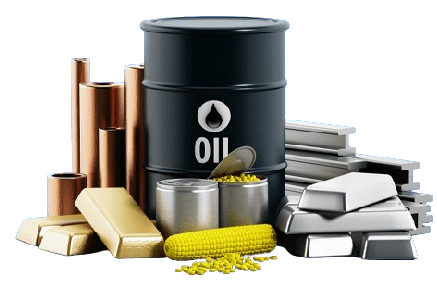Commodities
Trade a variety of popular commodity CFDs, and access some of the world’s biggest oil and natural gas markets
Buy and sell CFDs on spot commodities with tight spreads and spot execution directly on your MT5 platform

Liquidity & inflation-resistant
Liquidity & inflation-resistant Deep liquidity and inflation resistance make this asset class appealing to traders of al levels.

Oil CFDs' popularity
Oil CFDs are highly favored due to their connection to global economic conditions.

Portfolio Diversification
CFDs on commodities provide portfolio diversification and risk hedging.

Low-Cost
Low cost entry to commodity trading allows borders participation in the market.
Commodities Trading
What are Commodities?
Commodities are basic items of consumption of the worldwide economy. Do you have an opinion on gold, silver or coffee? Act on it! Commodities are traded around the world on different exchanges and are usually traded as future contracts.
On our platforms we provide CFDs, which are contracts, based on the price of an underlying asset, that don’t grant ownership of the physical goods. Traders like this aspect since you do not have to actually own the asset, yet you can trade them whenever you want.

What are the types of Commodities?
A commodity is a good used in business or on a market. Each commodity, when traded on an exchange, must meet standards and grades. They may each be slightly different, however, ultimately are the same amongst all producers. There are two different kinds of commodities, soft and hard:
Soft commodities – This refers to items that are grown as opposed to mined. For example, agricultural products such as sugar corn wheat coffee and more. Produced by farmers, these instruments are highly sensitive to climate and weather changes, and have cyclical price patterns dictated by seasons.
Hard commodities – This refers to items that are mined, such as Gold, other precious metals, diamonds and oil, along with other energy products.
Factors affecting Commodities Price?
- Supply and Demand – If supply and demand balance out, prices should stay the same. However, anytime the market thinks the supply will be lower due to weather or production cuts, prices tend to go higher, and vice versa; higher supplies tent to lead to lower prices.
- Inflation – When there is inflation, the price of a commodity usually changes accordingly.
- Stock and Inventories – Production of these commodity prices can be affected by the following; weather, crop diseases, production issues with staff, political and economic environments which form additional charges such as taxes, trade laws, subsides from governments etc.
Trade Commodities with iCapitals
- Spreads from 0.0 Pips
- All trading strategies enabled
- 24/5 Trading

Three types of accounts, catering to every trader, whether you are a beginner or experienced.
Nano Account
$50/ Min Deposit
Ideal for new and intermediate traders
- Leverage up to 1:400
- Spread starting from 10 points
- MT5 with EAs & 80+ technical tools
- ECN tech with Tier liquidity
- Access to advanced educational tools
- No Dealing Desk intervention
General Account
$100/ Min Deposit
Tailored for experienced traders
- Leverage up to 1:400
- Spread starting from 5 points
- MT5 with EAs & 80+ technical tools
- ECN tech with Tier liquidity
- Access to advanced educational tools
- No Dealing Desk intervention
PMS Account
$250/ Min Deposit
Designed for institutional traders
- Leverage up to 1:400
- Spread starting from 3 points
- MT5 with EAs & 80+ technical tools
- ECN tech with Tier liquidity
- Access to advanced educational tools
- No Dealing Desk intervention
Our Secure Payment Methods






Access to global market with just a single click. Forex, Commodities, Stocks & Indices
Instruments
Quick Links
More ways to reach us
-
Address: Suite 305, Griffith Corporate Centre, Beachmont P.O.Box 1510, Kingstown ,
St. Vincent and the Grenadines - Call: +447452052265
- Mail: support@icapitals.biz
Risk Warning:
Trading Forex and Leveraged Financial Instruments involves significant risk and can result in the loss of your invested capital. You should not invest more than you can afford to lose and should ensure that you fully understand the risks involved. Trading leveraged products may not be suitable for all investors. Trading non-leveraged products such as stocks also involves risk as the value of a stock can fall as well as rise, which could mean getting back less than you originally put in. Past performance is no guarantee of future results. Before trading, please take into consideration your level of experience, investment objectives and seek independent financial advice if necessary. It is the responsibility of the Client to ascertain whether he/she is permitted to use the services of the iCapitals brand based on the legal requirements in his/her country of residence. Please read iCapitals’ full Risk Disclosure.
Disclaimer:
The Transactions offered by this Website can be executed only by fully competent adults. Transactions with financial instruments offered on the Website involve substantial risk and trading may be very risky. If you make Transactions with the financial instruments offered on this Website, you might incur substantial losses or even lose everything in your Account. Before you decide to start Transactions with the financial instruments offered on the Website, you must review the Service Agreement and Risk Disclosure Information.The services on the Website are provided and registered by iCapitals Limited [ICAPITALS LIMITED], registered at: Suite 305, Griffith Corporate Centre, Beachmont P.O.Box 1510, Kingstown, St. Vincent and the Grenadines, which is fully registered and permitted to perform its activities by the laws of that country. Address: Suite 305, Griffith Corporate Centre, Beachmont P.O.Box 1510, Kingstown, St. Vincent and the Grenadines iCapitals Limited [ICAPITALS LIMITED] incorporated under registered number 24117 BC 2017 by the Registrar of International Business Companies, registered by the Financial Services Authority of Saint Vincent and the Grenadines.
Regional Restrictions:
iCapitals Limited does not provide services to residents of certain jurisdictions, such as: Russian Federation, Japan, the United States of America, Canada, EU countries and some other regions.
